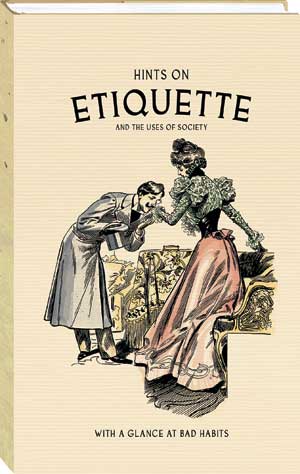The following excerpts on the subject of male etiquette are from ‘The Gentlemen’s Book of Etiquette and Manual of Politeness Being a Complete Guide for a Gentleman’s Conduct in all his Relations Towards Society’ published in 1873. – PW

“In the familiar intercourse of society, a well-bred man will be known by the delicacy and deference with which he behaves towards females. That man would deservedly be looked upon as very deficient in proper respect and feeling, who should take any physical advantage of one of the weaker sex, or offer any personal slight towards her. Woman looks, and properly looks, for protection to man. It is the province of the husband to shield the wife from injury; of the father to protect the daughter; the brother has the same duty to perform towards the sister; and, in general, every man should, in this sense, be the champion and the lover of every woman. Not only should he be ready to protect, but desirous to please, and willing to sacrifice much of his own personal ease and comfort, if, by doing so, he can increase those of any female in whose company he may find himself. Putting these principles into practice, a well-bred man, in his own house, will be kind and respectful in his behaviour to every female of the family. He will not use towards them harsh language, even if called upon to express dissatisfaction with their conduct. In conversation, he will abstain from every allusion which would put modesty to the blush. He will, as much as in his power, lighten their labors by cheerful and voluntary assistance. He will yield to them every little advantage which may occur in the regular routine of domestic life:—the most comfortable seat, if there be a difference; the warmest position by the winter’s fireside; the nicest slice from the family joint, and so on.
“In a public assembly of any kind, a well-bred man will pay regard to the feelings and wishes of the females by whom he is surrounded. He will not secure the best seat for himself, and leave the women folk to take care of themselves. He will not be seated at all, if the meeting be crowded, and a single female appear unaccommodated.
“A true gentleman never stops to consider what may be the position of any woman whom it is in his power to aid in the street. He will assist an Irish washerwoman with her large basket or bundle over a crossing, or carry over the little charges of a distressed negro nurse, with the same gentle courtesy which he would extend toward the lady who was stepping from her private carriage. The true spirit of chivalry makes the courtesy due to the sex, not to the position of the individual. When you are escorting a lady in the street, politeness does not absolutely require you to carry her bundle or parasol, but if you are gallant you will do so. You must regulate your walk by hers, and not force her to keep up with your ordinary pace. Watch that you do not lead her into any bad places, and assist her carefully over each crossing, or wet place on the pavement. If you are walking in the country, and pass any streamlet, offer your hand to assist your companion in crossing.
“If walking with a female relative or friend, a well-bred man will take the outer side of the pavement, not only because the wall-side is the most honorable side of a public walk, but also because it is generally the farthest point from danger in the street. If walking alone, he will be ready to offer assistance to any female whom he may see exposed to real peril from any source. Courtesy and manly courage will both incite him to this line of conduct. In general, this is a point of honor which almost all men are proud to achieve. It has frequently happened that even where the savage passions of men have been excited, and when mobs have been in actual conflict, women have been gallantly escorted through the sanguinary crowd unharmed, and their presence has even been a protection to their protectors. This is as it should be; and such incidents have shown in a striking manner, not only the excellency of good breeding, but have also brought it out when and where it was least to be expected.
“Civility is particularly due to all women; and, remember, that no provocation whatsoever can justify any man in not being civil to every woman; and the greatest man would justly be reckoned a brute if he were not civil to the meanest woman. It is due to their sex, and is the only protection they have against the superior strength of ours; nay, even a little is allowable with women: and a man may, without weakness, tell a women she is either handsomer or wiser than she is.
Imagine an etiquette book saying, “Civility is particularly due to all men; and, remember, that no provocation whatsoever can justify any woman in not being civil to every man; and the greatest woman would justly be reckoned a bitch if she were not civil to the meanest man.”
Exactly, caprizchka. I’m currently compiling old books dealing with etiquette/manners for men, and will probably present a series of articles showing that gynocentrism has long been the expected norm. Stay tuned….
LOL i’m a woman and this kinda angers me. Looks like pure submission. But women were submissive too during those times with no rights so…